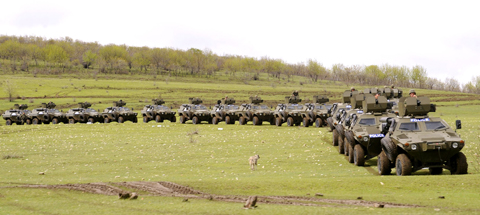NATO launched military exercises in former Soviet Georgia yesterday under a storm of criticism from Russia and following a rebellion in the Georgian military.
Russia has condemned the month-long war games as “muscle-flexing” on its southern border, where it sent tanks and troops in August last year in a five-day war to crush a Georgian assault on breakaway South Ossetia.
Georgia said on Tuesday it had put down a mutiny at a tank base east of the capital Tbilisi and accused Russia of trying to disrupt the exercises and foment a wider rebellion against Georgian President Mikheil Saakashvili.

PHOTO: AFP
Russia said the accusations were “insane” and accused Saakashvili of trying to shift the blame for weeks of opposition protests demanding he resign over his record on democracy and last year’s disastrous military defeat.
The exercises, which will not be in full swing until next week, involve more than 1,000 soldiers from more than a dozen nations.
They are being held at a former Russian air force base east of Tbilisi and a few kilometers from the Mukhrovani base, where the government said tank commanders had rebelled on Tuesday and were arrested several hours later.
NATO insists the exercises in “crisis response” and field training pose no threat to Russia. They are seen as a gesture of solidarity with Georgia, whose NATO membership ambitions have effectively been put on hold since the August war.
“The NATO secretary-general [Jaap de Hoop Scheffer] thinks that nobody should misuse the exercise,” spokeswoman Carmen Romero said on Tuesday. “This is not a NATO exercise, it is an exercise of NATO with its partners.
“This exercise has nothing to do with Georgia, it has nothing to do with Russia,” Romero said. “Georgia is just hosting the exercise and nobody should interpret the exercise in a different way and use it for other purposes.
Armenia, Russia’s strategic ally in the South Caucasus, on Tuesday joined Kazakhstan, Serbia and Moldova in pulling out.
Russia fiercely opposes membership for Georgia and Ukraine as an encroachment on its ex-Soviet backyard and traditional sphere of influence.

In the sweltering streets of Jakarta, buskers carry towering, hollow puppets and pass around a bucket for donations. Now, they fear becoming outlaws. City authorities said they would crack down on use of the sacred ondel-ondel puppets, which can stand as tall as a truck, and they are drafting legislation to remove what they view as a street nuisance. Performances featuring the puppets — originally used by Jakarta’s Betawi people to ward off evil spirits — would be allowed only at set events. The ban could leave many ondel-ondel buskers in Jakarta jobless. “I am confused and anxious. I fear getting raided or even

Kemal Ozdemir looked up at the bare peaks of Mount Cilo in Turkey’s Kurdish majority southeast. “There were glaciers 10 years ago,” he recalled under a cloudless sky. A mountain guide for 15 years, Ozdemir then turned toward the torrent carrying dozens of blocks of ice below a slope covered with grass and rocks — a sign of glacier loss being exacerbated by global warming. “You can see that there are quite a few pieces of glacier in the water right now ... the reason why the waterfalls flow lushly actually shows us how fast the ice is melting,” he said.

RISING RACISM: A Japanese group called on China to assure safety in the country, while the Chinese embassy in Tokyo urged action against a ‘surge in xenophobia’ A Japanese woman living in China was attacked and injured by a man in a subway station in Suzhou, China, Japanese media said, hours after two Chinese men were seriously injured in violence in Tokyo. The attacks on Thursday raised concern about xenophobic sentiment in China and Japan that have been blamed for assaults in both countries. It was the third attack involving Japanese living in China since last year. In the two previous cases in China, Chinese authorities have insisted they were isolated incidents. Japanese broadcaster NHK did not identify the woman injured in Suzhou by name, but, citing the Japanese

RESTRUCTURE: Myanmar’s military has ended emergency rule and announced plans for elections in December, but critics said the move aims to entrench junta control Myanmar’s military government announced on Thursday that it was ending the state of emergency declared after it seized power in 2021 and would restructure administrative bodies to prepare for the new election at the end of the year. However, the polls planned for an unspecified date in December face serious obstacles, including a civil war raging over most of the country and pledges by opponents of the military rule to derail the election because they believe it can be neither free nor fair. Under the restructuring, Myanmar’s junta chief Min Aung Hlaing is giving up two posts, but would stay at the